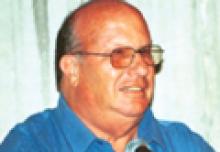BALTIMORE—A common molecule may prolong cell survival in patients with serious neurologic conditions, according to research presented at the 59th Annual Meeting of the Biophysical Society. “The present findings could provide a new lead compound for the development of drug therapies for necrosis-related diseases such as traumatic brain injury [TBI], stroke, and myocardial infarction—conditions for which no effective drug-based treatments are currently available [that work by blocking necrosis],” said Abraham H. Parola, MSc, a Professor of Biophysical Chemistry at Ben-Gurion University of the Negev in Beer-Sheva, Israel. Prof. Parola is a visiting professor of Biophysical Chemistry and Director of Natural Sciences at New York University Shanghai.
Stroke, heart attack, and TBI are separate diseases with certain shared pathologies that achieve a common end—cell death and human injury due to hypoxia. In these diseases, a lack of blood supply to affected tissues begins a signaling pathway that ultimately halts the production of energy-releasing adenosine triphosphate (ATP) molecules, which ultimately leads to cell death.
By employing derivatives of humanin, a naturally occurring peptide encoded in the genome of cellular mitochondria, researchers are working to interrupt this process, buying precious time for tissues whose cellular mechanisms have ceased to function.
The humanin derivatives work by counteracting the decrease in ATP levels caused by necrosis. The researchers tested the effectiveness of the humanin analogues AGA(C8R)-HNG17 and AGA-HNG by treating neuronal cells with these peptides prior to exposure to a necrotic agent. Results showed that humanin analogues reduced necrosis.
Prof. Parola’s previous work dealt with membrane dynamics and the mechanism of action of antiangiogenesis drugs, which starve malignant tumor growths by preventing the supply of nutrients and oxygen to the fast-growing tissue. Prof. Parola also has studied various other biophysical and molecular medicine and diagnostic topics.
“A recent paper published by our group suggested the involvement of cardiolipin [a phospholipid in inner mitochondrial membranes] in the necrotic process,” Prof. Parola said. “During this work, we stumbled upon humanin, were intrigued by its antiapoptotic effect, and extended it to [an] antinecrotic effect.”
Prof. Parola and his colleagues also performed in vivo studies by treating mice with TBI with an HNG17 analogue, which successfully reduced cranial fluid buildup and lowered the mice’s motor impairment severity scores.
As the peptides Prof. Parola and his colleagues used are derivatives of naturally occurring humanin, an ideal treatment might involve a drug delivery system with the HNG17 as the lead compound. The delivery process would be aided by the peptides’ ability to penetrate the cell membrane without the use of additional reagents.
Future work for this research team will include further exploration of ischemic activity in liver cirrhosis, as induced by acetaminophen activity, in addition to a search for a synergistic effect between humanin and other antinecrotic agents, such as protease inhibitors, to increase the clinical potential of humanin.


